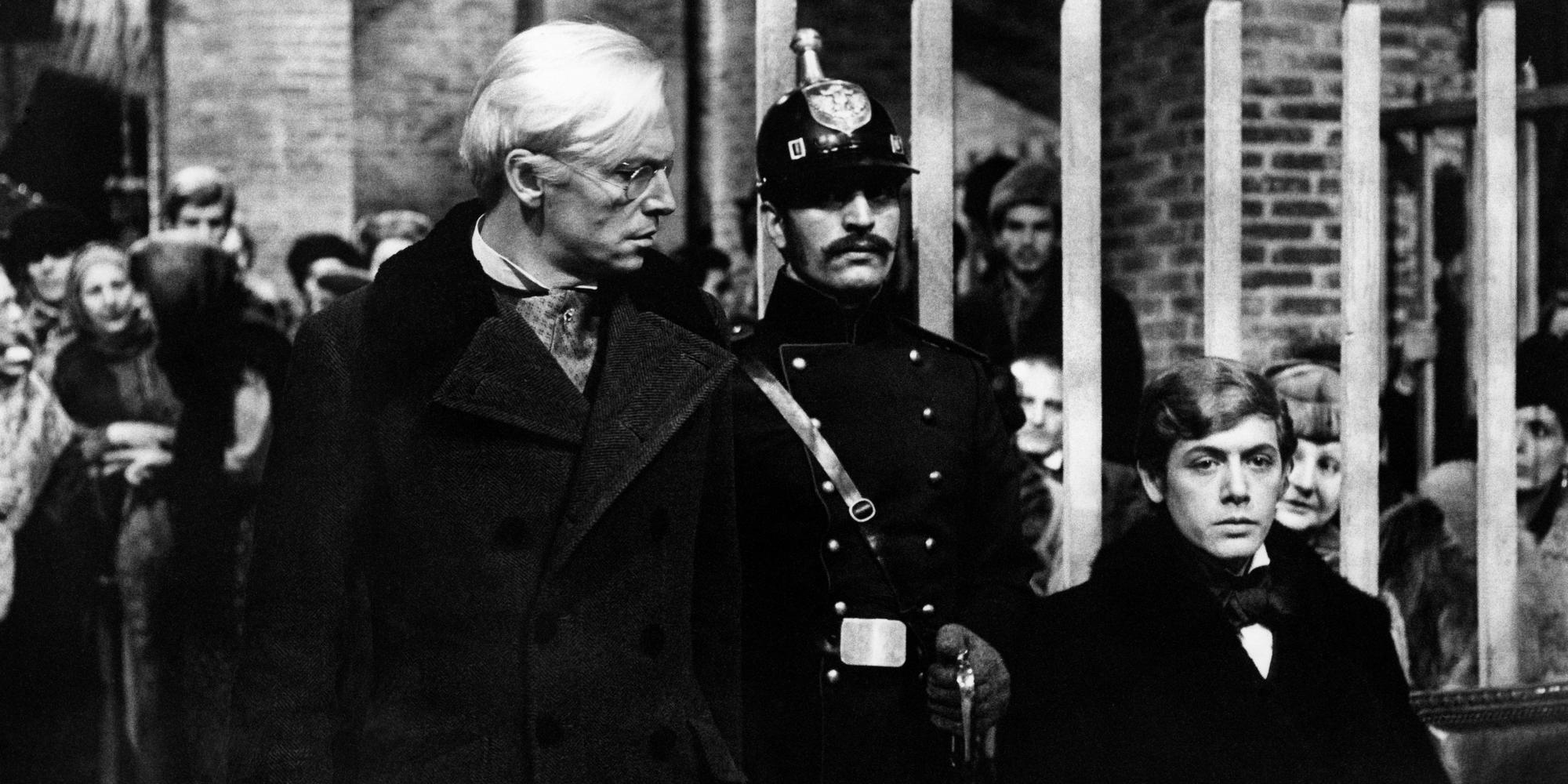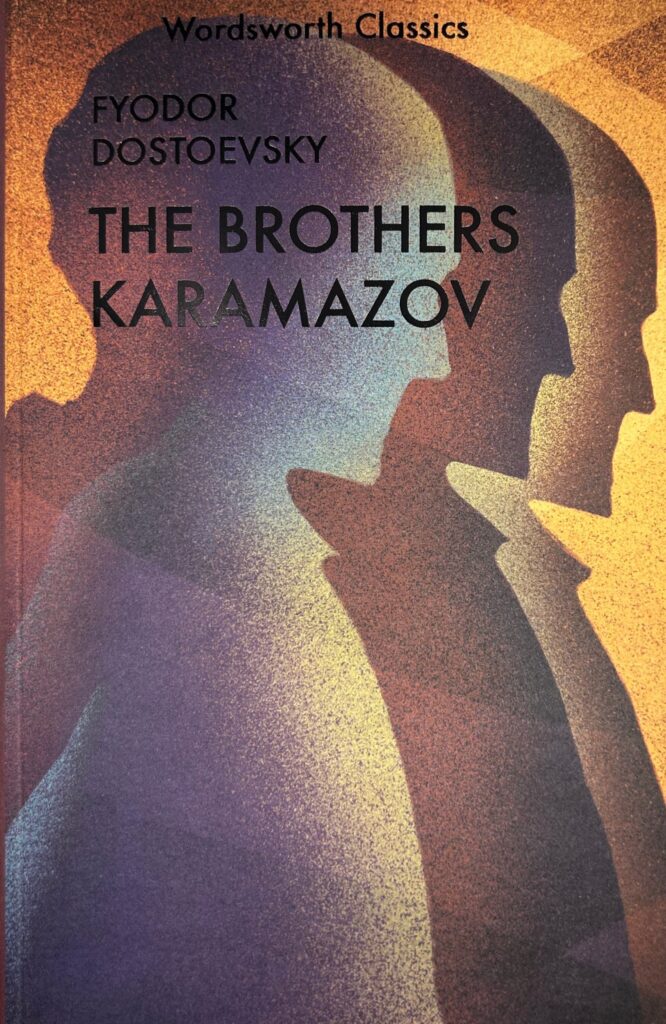
Mia Forbes looks at The Karamazov Brothers
The Devil is in the Details: Mia Forbes looks at Fyodor Dostoevsky’s final novel, considered by many to be his finest.
Of the 96 chapters that make up The Brothers Karamazov*, only one begins with the first person: “I am not a doctor, yet I feel that the moment has come when I must inevitably give the reader some account of the nature of Ivan’s illness”. The very first word reminds us that the story is being reported by an internal intermediary. Of course, the reader has not made it all the way to Book 6 Chapter 9 without realising that there is a narrator, but the themes of truth and falsehood, and illusion and reality, that pervade this section of the book lend additional meaning to his involvement. We are invited to reconsider how far we can trust what we are told.
Ivan Fyodorovich is the middle of the three eponymous brothers around whom Dostoevsky’s tale is centred. Aloof and intellectual, he is plagued by doubt and despair that stem from his inability to reconcile the suffering he perceives with the idea of a just and benevolent God. He concludes that such a deity cannot exist, which leads him, via a labyrinth of ethical and moral scrutiny, to deny the very categories of good and evil. And yet despite his attempts to live by this cold, dispassionate logic, free from the burden of right and wrong, Ivan cannot help himself expressing moral judgements, feeling disgusted at those who commit brutal actions, and empathising with those who fall foul of them. Ivan denies God, and yet a world without His divine justice, in which there is no punishment for evil or reward for good, and indeed in which forgiveness for evil is demanded, appears to legitimise the behaviour he finds so abhorrent, namely, that of his father, Fyodor Pavlovich, whose sole aim in life is the satisfaction of his senses.
Ivan’s uncertainty is brought to a head when Smerdyakov, the family servant and probably his illegitimate half-brother, confesses that he has killed their father, claiming that it was their philosophical conversations that convinced him to commit the murder. “All things are lawful”, he reasons, a concept that both he and the eldest brother, Mitya, pick up from their discussions with Ivan. This charge plunges him into a spiritual, ethical and eventually physical crisis, and he is forced to acknowledge that his beliefs have led to, and in some sense justified, parricide. He consequently lapses into fits of fever, madness and delusion.
During one such episode, Ivan is visited by the devil in the guise of ‘a gentleman’. So determined is he to deny the existence of God, and therefore of Satan, that throughout their conversation he refuses to acknowledge that the apparition is a separate entity, insisting that it is simply a manifestation of his own thoughts: “No, you are not some one apart, you are myself, you are I and nothing more! You are rubbish, you are my fancy!”.
The reader may perhaps have already assumed that this was the case – Ivan is after all experiencing a hallucination – and yet his determination to exclude the possibility of an autonomous presence compels us to consider it all the more. Does the devil exist, or is he an emanation of Ivan’s fevered mind? The deliberate ambiguity of Satan’s existence is pivotal not only to the plot, but also at a higher level, colouring everything that Dostoevsky has to say about religion and faith.
The gentleman certainly echoes many of Ivan’s views:
“‘Je pense, donc je suis’, I know that for a fact; all the rest, all these worlds, God and even Satan — all that is not proved, to my mind. Does all that exist of itself, or is it only an emanation of myself, a logical development of myself which alone has existed forever.”
By referencing Descartes, the devil aligns himself and Ivan with the philosophy of the Enlightenment. There is a huge irony in this, however, since the statement, which aims to provide a definitive foundation for knowledge in the face of doubt, is being articulated by the very embodiment of Ivan’s confusion and uncertainty. In fact, many of the views presented by the devil correspond closely with those contemporary philosophies that saw religion as a thing of the past:
“As soon as men have all of them denied God…everything will begin anew. Men will unite to take from life all it can give, but only for joy and happiness in the present world. Man will be lifted up with a spirit of divine Titanic pride and the man-god will appear. From hour to hour extending his conquest of nature infinitely by his will and his science…he may lightheartedly overstep all the barriers of the old morality of the old slave-man”.
With his strident belief in all things rational and his rejection of a loving God, this path might well be thought to appeal to Ivan, and yet of all the things that the gentleman says, it is this that triggers him the most. Covering his ears and trembling all over, he finally lashes out and throws a glass at the devil. He then hears a knocking on the window and after several moments of struggle breaks free from the reverie to find the glass still standing on the table before him and the gentleman gone. At his window is his brother, Alyosha, with the news that Smerdyakov has committed suicide.
The youngest of the three Karamazovs, the pious, humble and positive Alyosha, is the opposite of his brother; his utter faith in God is in complete contrast to Ivan’s atheism and doubt. Their conversations explore the most profound depths of human nature and theology, and in many ways, it is clear that Ivan envies his brother. It seems that for him atheism is hard-worn, a viewpoint that he forces himself to adopt out of his supposed rationality, while in reality, he covets the optimism, love and certainty Alyosha can enjoy because of his unwavering faith.
Part of Ivan’s determination to deny the devil’s existence comes from his desperation not to be confronted by a higher being. If he accepted the possibility of a higher being, he would be forced to reconsider, and potentially renounce, the standpoint which he has defended so staunchly and which has caused him a great deal of anguish. Indeed, Satan detects Ivan’s latent yearning to accept the comforts of religion:
“From the vehemence with which you deny my existence,” laughed the gentleman, “I am convinced that you believe in me.”
“Not in the slightest! I haven’t a hundredth part of a grain of faith in you!”
“But you have the thousandth of a grain. Homoeopathic doses perhaps are the strongest. Confess that you have faith even to the ten-thousandth of a grain.”
“Not for one minute,” cried Ivan furiously. “But I should like to believe in you,” he added strangely.
“Aha! There’s an admission!”
Despite the very essence of faith being so firmly set in the unknown, far away from the world of proof, argument and evidence inhabited by Ivan, it is the non-believer in Dostoevsky’s story that is plagued by doubt and uncertainty. Writing in his personal diary on March 23, 1876, the author voiced a similar idea: “Faith and mathematical proof are two irreconcilable things. There’s no stopping someone who has made up his mind to believe”.
It is therefore the devil’s job to keep Ivan teetering on the edge, unwilling to dive headfirst into Christianity as Alyosha has done, but no longer fully committed to atheism either. This torment takes the form not of physical persecution, threats or intimidation, but through quite civilised conversation, at least until Ivan starts throwing things. The gentleman’s speech is charming, beguiling and witty; his appearance is refined but dated, like a member of the landowning class that Dostoevsky derides throughout his various works; he tells anecdotes, makes references to contemporary Russian figures, and quotes in several languages, all while maintaining the utmost modesty. On the whole, he is an excellent conversationalist.
It is not unusual for the devil to be presented in this way. Milton’s Satan is widely renowned as one of literature’s great characters, his sly rhetoric seducing Eve into taking the forbidden fruit; his argument has clear parallels with the speech made by the gentleman, as he tells her that “ye shall be as gods”. In Goethe’s Faust, Mephistopheles shares a similar sense of cultivated urbanity. He first comes onstage “dressed as a wandering Scholar” and soon impresses Faust with his erudition. Likewise, Woland of The Master and Margarita is every bit the gentleman in appearance and speech, “wearing an expensive grey suit and imported shoes of a matching colour. His grey beret was cocked rakishly over one ear; under his arm, he carried a stick with a black knob shaped like a poodle’s head.” Even dear old Uncle Screwtape manages to elicit a reluctant chuckle from the most pious of readers.
Why is it so compelling to present Satan, the great betrayer, the “Prince of Darkness”, as a charismatic raconteur? Why is it the devil who so often becomes our favourite character? His compelling speeches and witty repartee are ultimately far more dangerous than the monstrous claws, deadly fangs or conveniently human-sized cooking pots with which Medieval artists accessorised him. These may be the tools of punishment, but the good person has nothing to fear from them; it is language that has the power to beguile, convince and persuade even the most righteous of people. Physical intimidation may coerce someone into doing your bidding against their will, but verbal mastery can conquer the heart and soul. Satan’s poisonous and seductive rhetoric brings out the darker side of his interlocutors; evil is not imposed on them by an external force, but extracted from the very core of their being.
Paraphrasing the Latin playwright Terence, Dostoevsky’s gentleman explains that “Satan sum et nihil humanum a me alienum puto” (‘I am Satan and I consider nothing human to be alien to me’). By presenting the devil as a figure more human than monster, the author issues a clear reminder that the greatest challenge is to identify, accept and resist the evil in oneself. The character of the gentleman holds up an alarming mirror to Ivan, taunting him with the very same words that Smerdyakov used to justify his murder: “all things are lawful”. Ivan’s struggle to discover the source of evil, either within or outside of himself, leaves him enervated and debilitated, and even at the end of The Brothers Karamazov, it is still not clear whether he will overcome the fits of madness that continue to plague him. The uncertainty of his recovery represents the ongoing search for truth, clarity and justice in the face of delusion, ambiguity and suffering.
* The title is translated as either The Brothers Karamazov or The Karamazov Brothers. Our edition uses the latter, as the preference of the writer of the introduction to our edition.
Image: Umberto Orsini and Carlo Simoni, in the 1969 film The Brothers Karamazov
Credit: MARKA / Alamy Stock Photo
Books associated with this article
